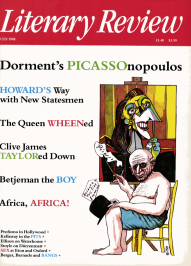Pamela Vandyke Price
Where Does One Stop?
The Demon Drink
By Jancis Robinson
Mitchell Beazley 208pp £9.95
Anything – yes anything – put into human orifices to excess is a potential danger. There are vogues in danger and currently it’s drink, in the alcoholic sense, that’s being castigated. Jancis Robinson is a Master of Wine, a competent journalist – and a ‘young mum’. Her text, which l think might have been more effective as either a monograph or a more substantial work of reference, is somewhat womb-orientated, breasts and foetuses frequently stressed as being at risk for drinking mothers.
Since female readers are addressed as ‘sisters’, I’ll venture a great-auntly comment that, in dealing with women and drink, she might have included both the pre-menstrual and menopausal problems. Why people drink is a complicated subject, but many women must, like me, have had their first nips of brandy or Scotch in hot water for ‘cramps’ and there are probably many older ladies sadly soaking up the sort of wine that can no longer be termed ‘tonic’ just because, whether married, mothers or neither, they are lonely. Alcohol is both a nutrient and nutriment: a pre-prandial sip can create an appetite in the convalescent disinclined for solid food, a nightcap may be far gentler as a sedative than a pill. Jancis writes wisely that alcohol is a ‘desirable mellower of the autumn of life’. Yes – but for the potential geriatric dipsomaniac, where does one stop? Cirrhosis is a remote peril, rheumatism and unpaid bills, plus various forms of heartache, are immediate.
There are lots of facts and figures, although the list of authorities cited is short and mostly of British origin; there are not enough from doctors in wine-producing countries. The author suggests that a day or two of abstention is healthy, if one regularly drinks heavily . Nobody obliged to sample fifty or more wines daily for weeks at a time would find this a hardship. I do not, though, understand why Jancis finds that ‘professional wine tastings, which usually take place in late morning, seem so much more intoxicating even to quite diligent spitters than they should.’ Ah, youth, youth! The writer is only half my age. It isn’t intoxication l feel after a morning of young wines – it’s the roots of my teeth and my gums that hurt from the tannin and acidity!
Jancis is starry-eyed about countries where wine is a routine commodity such as Greece where ‘drink is extremely familiar and drunkenness almost unknown’. The Mediterranean diet is somewhat abundant in ‘blotting paper’, rice, pasta and oil. When l started going out with the medical student who was to become my husband the preliminary was a dollop of olive oil to delay the effects of drink; the glass of milk was the counteracting agent on one’s return. When I read ‘except in a handful of Parisian wine bars haunted mainly by foreigners, drinking wine without food is regarded as bizarre behaviour’, I wonder where I’ve been taking those coups de blanc et rouge in the past forty years. Some of the generalisations in this book should have been related to the differences of climate, diet, social customs and medical traditions in the regions where drink is taken; this is why I think it should have been longer – or shorter. Nor should the editors have permitted statements relating to scientific matters to stand without particularisation – ‘What has been firmly established’ and ‘Several surveys have shown’. The subject is of importance and assertions should be linked to relevant research.
Don’t be deterred by the smirky photograph of the author – she is much prettier. But I hope she will henceforth give us of her knowledge and discrimination – and not be too concerned to stress ‘women’s angles’ just because she is a woman. Parturition may alter one’s approach to drink – I wouldn’t know. But if anybody suggested that I wrote like a woman I should be extremely put out. Indeed, it’s one of the few insults I haven’t collected. There’s no sex in the tasting room, and no nappies either, I trust.

Sign Up to our newsletter
Receive free articles, highlights from the archive, news, details of prizes, and much more.@Lit_Review
Follow Literary Review on Twitter
Twitter Feed
Under its longest-serving editor, Graydon Carter, Vanity Fair was that rare thing – a New York society magazine that published serious journalism.
@PeterPeteryork looks at what Carter got right.
Peter York - Deluxe Editions
Peter York: Deluxe Editions - When the Going Was Good: An Editor’s Adventures During the Last Golden Age of Magazines by Graydon Carter
literaryreview.co.uk
Henry James returned to America in 1904 with three objectives: to see his brother William, to deliver a series of lectures on Balzac, and to gather material for a pair of books about modern America.
Peter Rose follows James out west.
Peter Rose - The Restless Analyst
Peter Rose: The Restless Analyst - Henry James Comes Home: Rediscovering America in the Gilded Age by Peter Brooks...
literaryreview.co.uk
Vladimir Putin served his apprenticeship in the KGB toward the end of the Cold War, a period during which Western societies were infiltrated by so-called 'illegals'.
Piers Brendon examines how the culture of Soviet spycraft shaped his thinking.
Piers Brendon - Tinker, Tailor, Sleeper, Troll
Piers Brendon: Tinker, Tailor, Sleeper, Troll - The Illegals: Russia’s Most Audacious Spies and the Plot to Infiltrate the West by Shaun Walker
literaryreview.co.uk